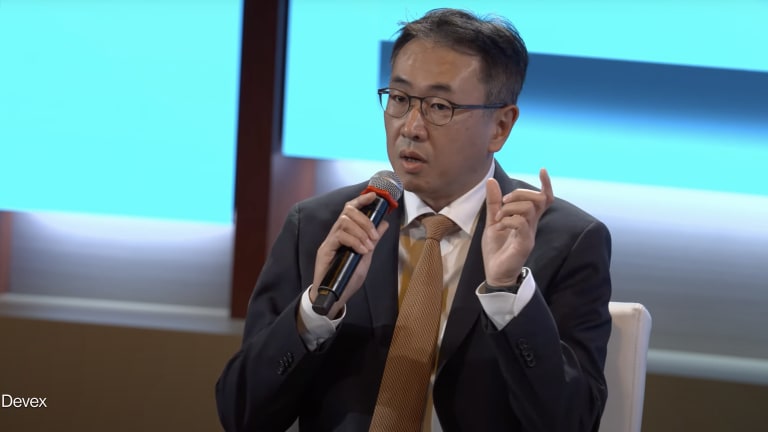
WASHINGTON — World Bank President Jim Kim resigned on Monday, setting off discussions about who his successor may be and how that person will be chosen. The process will likely look quite similar to the one that led to Kim’s appointment to the post, but the bank’s board has not yet indicated exactly what the process will be this time around.
Jim Kim's resignation sparks questions about the next World Bank president
Jim Kim's sudden resignation raises concerns about who will take over as president of the World Bank, renewing a debate about whether the U.S. should control the presidency.
Throughout the World Bank’s history, it has been a given that the nominee the United States, the largest shareholder, puts up forward would be approved by the board. But following calls for a more open, merit-based, and transparent selection process, with nominations open from all board members, the board established a new process in 2011, which governed Kim’s selection. In the lead up to Kim’s 2012 appointment, he became the first U.S. nominee to face an official challenger.
The process spelled out in 2011 is expected to be the blueprint for this selection process as well. Executive directors can nominate candidates for the post — candidates must be citizens of one of the bank’s member countries and cannot be a bank governor, executive director or alternate. Executive directors are expected to clearly communicate and define the nomination period.
The process begins when the board decides to announce that a nomination process is open, indicating the timeline for submitting nominations. On Monday, the board said in a statement that it will immediately start the process for selecting the next president, but did not indicate any timelines or further details about the process.
“It is not realistic for the U.S. to continue to support the World Bank at current levels if it loses the World Bank presidency.”
— Daniel Runde, senior vice president and director, the Project on Prosperity and DevelopmentIf there are more than three candidates, there will be a shortlisting process where the board will narrow the field through an informal straw poll or vote. The shortlisted candidates will be interviewed by the board and then the board will make a final selection. While only a majority vote is required, the guidance strongly suggests that the board come to a unanimous consensus.
The selection process, including board interviews and candidates under consideration, is confidential though individual board members can release the information.
According to the 2011 guidance, World Bank presidential candidates are required to have:
A proven track record of leadership.
Experience managing large organizations with international exposure, and a familiarity with the public sector.
Ability to articulate a clear vision of the Bank’s development mission.
A firm commitment to and appreciation for multilateral cooperation.
Effective and diplomatic communication skills, impartiality, and objectivity.
Kim announced his departure with some three years remaining in his term, but the new president would likely begin a new five-year term once selected.
While the debate about whether another American man should take the post will certainly be aired, Daniel Runde, a senior vice president and director of the Project on Prosperity and Development at the Center for Strategic and International Studies said there is no reason to have a discussion about other candidates if the U.S. puts forward a strong, qualified candidate.
“It is not realistic for the U.S. to continue to support the World Bank at current levels if it loses the World Bank presidency,” he said.
Runde said he would expect the administration to nominate a candidate before too long so the process can progress.
Kim’s approval took between eight and 12 weeks once the process was officially launched, but Scott Morris, a senior fellow and director of the U.S. Development Policy Initiative at the Center for Global Development, said he doesn’t know how long it will take this time. The last time a president left in the middle of his term — Paul Wolfowitz — there was no interim president.
Wolfowitz announced he would leave in May and Robert Zoellick started his tenure as bank president the day after he departed less than two months later. This time, however, the World Bank has said that CEO Kristalina Georgieva will be the interim president.
While the process may be similar to Kim’s, there are questions about how quickly the board will start the clock on the selection and how it will lay out the process this time around, Morris said.
“I don’t know how long it will take to get a World Bank president because I don’t know if there is a clear will among the majority of countries to launch the process right away,” he said, adding that there may be an interest in relying on an interim president if countries are nervous about who the Trump administration might put forward as a candidate.
“Countries will not be shy, there will be a lot of discussion on process issues, what should happen now, how long they should wait, etc.” Morris said.








